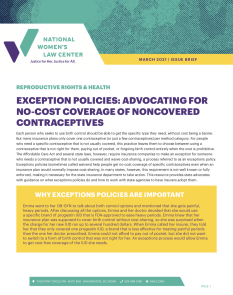Abortion rights, women of color, and LGBTQI+ people are under attack. Pledge to join us in fighting for gender justice.

 Many insurance plans cover only one contraceptive in each method category. For people who need a specific contraceptive that is not usually covered, this practice leaves them to choose between using a contraceptive that is not right for them, paying out of pocket, or forgoing birth control entirely when the cost is too high. In these cases, the Affordable Care Act and many state laws require insurance companies to waive cost-sharing for the non-covered contraceptive, through what are often called exceptions policies. But this requirement is not well known or fully enforced, making it necessary for the state insurance department to take action. This resource provides state advocates with guidance on what exceptions policies do and how to work with state agencies to have insurers adopt them.
Many insurance plans cover only one contraceptive in each method category. For people who need a specific contraceptive that is not usually covered, this practice leaves them to choose between using a contraceptive that is not right for them, paying out of pocket, or forgoing birth control entirely when the cost is too high. In these cases, the Affordable Care Act and many state laws require insurance companies to waive cost-sharing for the non-covered contraceptive, through what are often called exceptions policies. But this requirement is not well known or fully enforced, making it necessary for the state insurance department to take action. This resource provides state advocates with guidance on what exceptions policies do and how to work with state agencies to have insurers adopt them.

